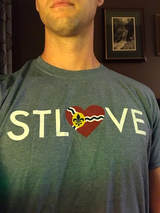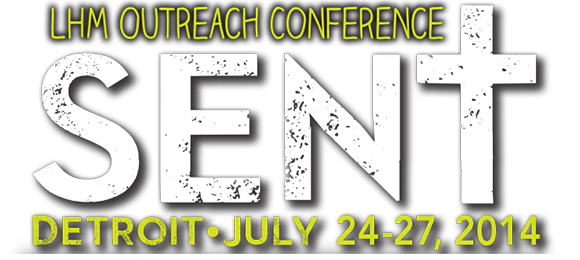|
Every weed has a root. I contend that under every sin is an identity issue. It's a thesis I’ve been working with for awhile. The worst things about us are often an attempt to justify a self made identity. Greed, ego, self-importance, addiction, sexual conquest. These are symptoms of something deeper. There’s always a root under the stem and leaves.
Sometimes ministry is like firing a cannon. You stand at a distance, choose targets, and fire strategic shots. But sometimes, ministry is like a knife fight in a crowd. Things get serious. There is a continuous onslaught of threats and challenges that require physical, emotional, and spiritual energy. It’s hand-to-hand combat.
I had a realization a few weeks ago: Jesus didn’t write anything. Unlike many historical figures or religious leaders, he himself left no writings. Yes, we believe the Bible is inspired by God, but Jesus didn’t actually pen it. Why is this important?
The San Francisco Bay Area is trendy, techie, and cool.
New York is the impressive intersection of the world - business, media, arts, culture . . . Nashville and Austin are hot and happening cities with booming populations. I live in St. Louis, Missouri. St. Louis was hot at the turn of the century - the 20th century. We hosted the World's Fair in 1904 and were the fourth largest American city, the Gateway to the West. Today, we're a worn and tired city. We've lost our NFL team and a few Fortune 500 companies. We suffer from a history of racism, white flight, and social disparity. We're anxious right now because of tension over the acquittal of a white police officer who shot and killed a black man. Over the weekend, we witnessed clashes between protesters and police that returned us to 2014 and the unrest that followed the death of Michael Brown in Ferguson. Twelve years ago, I resisted St. Louis residency. I did not choose to live here. It was chosen for me. Today, I claim this territory as my hometown. What happens when God calls you to a place you don't want to be? Is it worth all the work? How much difference does it make? He's discouraged as his church continues to decline. She's frustrated by the people she helped; they returned her generosity with resentment. He poured his heart out for a friend in need and it seemed to make no difference. What do you do when you want to quit? On Sunday, I watched Lebron James complete his decimation of the Golden State Warriors. He was a terror during the last three games in particular. Whatever your opinion of James, he was ferocious.
41 points in both games five and six. A triple double in game seven. Never has a teams come back from being down 3-1 in the NBA Finals. And all that against a Warriors team that had the best regular season record in NBA history. Sports writer Bill Simmons has a term for this: the Alpha Dog. Michael Jordan had it. Larry Bird had it. Lebron has it. At the right time, in the biggest moments, they simply take over. Go for the kill. Slay the opponent. The Alpha Dog asserts dominance. My son picks up a penny off the parking lot. “Dad! A penny!!!” He handed it to me and I quickly discarded it, flipping it back to the blacktop. Pennies are a nuisance. There is even talk that U.S. Treasury might discontinue them. It actually costs1.8 cents to produce a penny, almost twice as much as its face value. In 2013, taxpayers lost $105 million on the making of pennies and nickels.
My son picked the penny up again. “Can you even believe this is on the ground?! Should we look for the owner? Maybe they’re missing it. If we can’t find them, can I keep it?!” I saw the penny as insignificant. He saw it as a treasure. The Bible consistently lifts up three types of people who are the most insignificant in society . It’s time for the junior high dance. The whole school gathers in the gymnasium. The music begins to play. The boys line up on one side of the gym, single file, sheepishly staring at their shoes and mumbling to one another.
The girls are gathered on the other side of the gym in small huddles, giggling and glancing, asking “Is he looking at me?” But the boys aren’t looking at them. They’re looking at their shoes. The gym is segregated and no one will walk across the room. It’s as if there is an invisible barrier, an electric fence. And anyone who crosses the center line will be shocked. And so the music plays, but no one dares to walk across the room. Bill Hybels wrote a book a few years back titled Just Walk Across the Room. I’ve actually never read the book, but the analogy is compelling. In a world of immense division, it's incredibly difficult to walk across the room – to cross barriers and boundaries in order to engage those on the other side.  These are some common complaints about Christians: “Christians just preach at you.” “They shove the Bible down your throat.” “I got the 'Jesus lecture.'” “They tell me what to believe, but they don’t even know me.” In general, Christians have a reputation for speaking too quickly and listening too slowly. In an earnest attempt to share "the answer," we speak before we've heard the question. Any student of public speaking is taught, "you have to know your audience." Maybe we haven't listened long enough to know who we're speaking with. God gave us two ears and one mouth so that we would do twice as much listening as speaking. So how good of a listener are you? A necessary skill for Christians in the 21st century is the art of listening. Jesus gave us the Great Commandment: “Love the Lord your God with all your heart and soul, mind and strength. And love your neighbor as yourself.” To love your neighbor means that you have to know your neighbor. To “love your neighbor as yourself” means that you have to know your neighbor at least as well as you know yourself. Which is to say that the Great Commandment requires you to be present and to listen. "Loving our neighbor" means demands that we listen to our neighbor. We are curious and inquisitive about people. We ask “Who are you?” and then shut up long enough to hear the answer. To get to the question of "Who are you?" here are some questions I commonly use to get to know people.
Person: "I believe my cat is a divine being and I worship my cat in a ritualistic ceremony involving cotton balls, duct tape, and a princess tiara." Me: "That's interesting. Why do you think that?" ("I still think you're crazy.") It is increasingly vital that Christians hone the skill of listening. The Great Commandment demands that we know our neighbors. After all, God knows who you are. He even knows your polluted past and the parts you’re embarrassed for anyone to see. The amazing thing is that he knows who you are and he still stays with you. Now will you do the same for someone else? I'm supposed to plug this event because I'm speaking at it. So here it is. I'm not the New York Times best selling author. I'm not the speaker of the Lutheran Hour. Scroll to the far bottom of the page. Literally, the bottom of the page.
Seriously, I am excited to be invited. Our congregation is chewing on two words - Loved and Sent. The word mission comes from the Latin missio - "to send." The term "apostle" means "sent one." The inference is that a "sent one" is sent with the authority of the sender. So this is our task as a people of God. We can't remain static. We're sent. |
JOIN My Tribe
|












